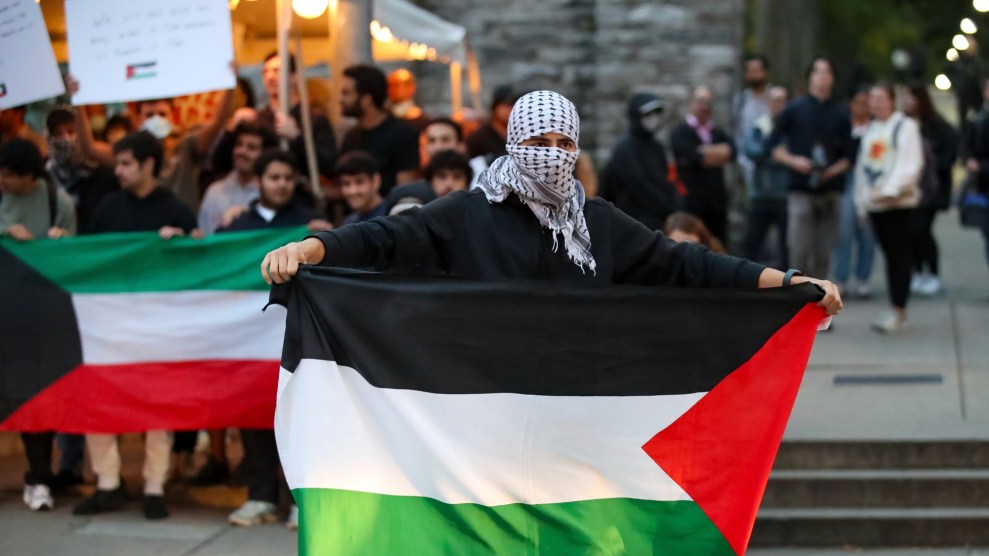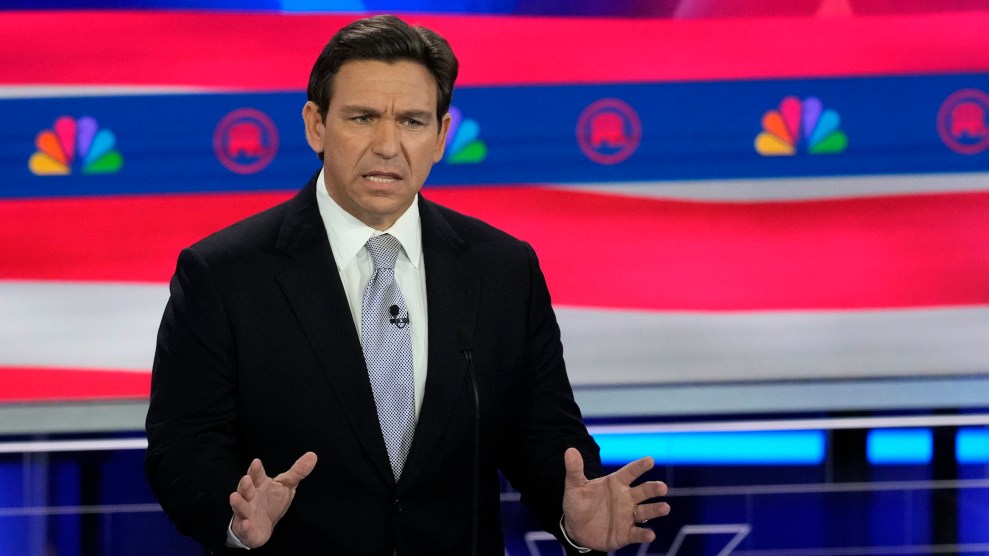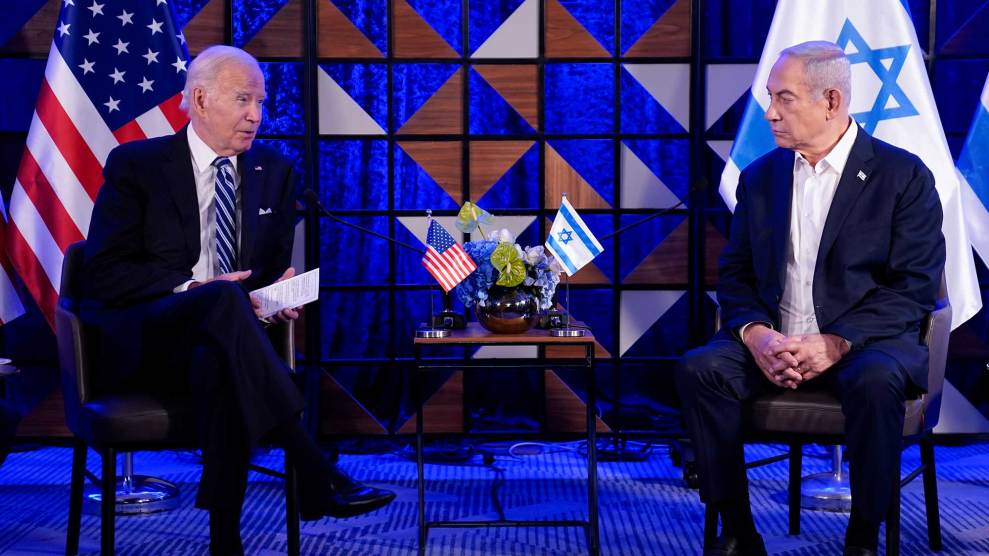
A protester holds a Palestinian flag during demonstration at Penn State on October 12, 2023.Paul Weaver/Sipa via AP
Last month, the head of Florida’s public university system issued a directive. After consulting with Gov. Ron DeSantis (R), Chancellor Ray Rodrigues ordered the state’s universities to “deactivate” campus chapters of Students for Justice in Palestine. Rodrigues suggested—without evidence—that the national SJP organization was violating criminal laws by providing “material support” to Hamas, which two weeks earlier had massacred roughly 1,400 people in Israel. In a similar letter, Anti-Defamation League CEO Jonathan Greenblatt called on universities across the country to “investigate the activities” of SJP chapters “for potential violations of the prohibition against materially supporting a foreign terrorist organization.”
Rodrigues and Greenblatt based their demands in large part on a public relations “toolkit” in which the national SJP described the October 7 attack as “a historic win for the Palestinian resistance.”
“SJP chapters are supporting & praising Hamas terrorism,” Greenblatt wrote after the toolkit became public. “This is unacceptable, dangerous & despicable.” That may be so, but as attorney Greg Lukianoff explains, the document wasn’t evidence of a crime—and it certainly shouldn’t be used by universities to interfere with constitutionally protected speech. “We don’t even think the analysis is particularly hard,” he told me last week during a wide-ranging interview about threats to campus free speech during the Israel-Hamas war.
Lukianoff—the co-author of the new book The Canceling of the American Mind—is the president and CEO of the Foundation for Individual Rights and Expression, a civil liberties group that for years has battled to protect the free speech rights of college students, staff, and faculty. After Rodrigues ordered the closure of SJP chapters, FIRE wrote its own letter to Florida universities, calling on them to “refuse the State of Florida’s order to violate” students’ rights. To do otherwise, FIRE argued, would represent “unconstitutional viewpoint discrimination.” (Disclosure: I’ve donated a small amount of money to FIRE.)
Since we spoke last week, there’s been a bit of hopeful news. According to one key DeSantis ally, two of Florida’s most prominent public universities are “openly disobeying” the order to disband SJP chapters. The schools, according to Politico, cite “lingering legal concerns” for their unwillingness to immediately comply with the governor’s demands.
But elsewhere, the crackdown on campus speech has only accelerated, as Republicans, including DeSantis, demand the deportation of foreign students who they accuse of harboring sympathies for Hamas. On Monday, Brandeis University announced it was shuttering its SJP chapter. “This decision was not made lightly, as Brandeis is dedicated to upholding free speech principles,” the university insisted, according to Jewish Insider. The school went on to explain that the group would “no longer be eligible to receive funding, be permitted to conduct activities on campus, or use the Brandeis name and logo in promoting itself or its activities, including through social media channels.”
Here’s my conversation with Lukianoff, which has been edited for length and clarity.
The DeSantis administration in Florida—
Yes. The DeSantis administration gives us a lot of work.
You demanded that universities refuse to comply with the governor’s order that they decertify Students for Justice in Palestine chapters. Can you tell me why you think what Florida is trying to do is unconstitutional?
We don’t even think the analysis is particularly hard. Essentially, what Florida is claiming is that SJP chapters are materially supporting a terrorist organization. And one of the reasons why you have to look at this in some amount of puzzlement is because if they really had the goods, if they really knew that these students and student groups were funneling material support to Hamas, they would be prosecuted. That’s a felony. And as best we can tell from DeSantis’ own statements, he’s just basing it on some of the rhetoric in SJP’s “toolkit”…If they had real evidence, that would be a very different case. But it’s clear, at least to me, at this point, they don’t have real evidence.
A day after Florida’s letter, the Anti-Defamation League came out with a similar letter, asking for an investigation into whether these groups were “materially supporting a foreign terrorist organization.”
I actually hadn’t seen that letter. And if they produce some kind of, you know, something that indicates probable cause that essentially this might actually be really happening, then I think this becomes quite a different case. But so far, I haven’t seen any real evidence that…actually would undergird that. And I think that’s a very serious charge to make, and you better have some evidence when you make it.
The ADL also said, “If universities do not check the activities of their SJP chapters, they may be violating their Jewish students’ legal rights to be free of harassment and discrimination on campus.” How do you think about balancing whose rights are being protected?
We have come to the defense of Jewish students, we’ve come to defense of SJP, in many, many cases [over the years]. They are some of the least fun cases we’re involved in—anything related to Israel-Palestine—because they’re just so entrenched, and they can be so intense.
You have to take all of these on a case-by-case basis. Given the intensity of what’s going on on campus, I do think schools have an obligation to look into threats, intimidation—incitement is a very hard standard to meet, but that could possibly be there—and claims of discriminatory harassment. In order to make the discriminatory harassment standard not something that swallows freedom of speech, it has to be severe and persistent, targeted harassment. And if schools are following that high standard, we have seen situations in the past that actually do meet it. So this is a situation where schools should definitely be investigating claims of discriminatory harassment and threats. But students deserve due process.
In terms of things that crossed the line, there was a Stanford class where the students allege that the professor had Jewish students self-identify, [separated them from] their stuff…and then called them colonizers and said that [colonizers] were responsible for more people than were killed in the Holocaust. And the analysis there, of course, it’s just simple discrimination. And as far as that professor being punished in that context—if the facts are true, and of course, again, deserves due process—that’s something that you could punish a professor for.
Have you seen ways in which universities have found more appropriate or more constructive ways to counter antisemitism or Islamophobia in recent weeks?
I do think that most schools are kind of struggling at the moment. And I think it’s been an interesting time, because FIRE has always advocated for the “Kalven Report,” which is the 1967 statement by the University of Chicago that the university will restrain itself from commenting on matters of international news, national news—things that don’t directly impact the campus. I used to be a little bit of a skeptic of the Kalven Report…but over the years, I realized that the statements that universities officially make can create a serious problem for academic institutions, which is that academic freedom relies on universities not creating an orthodoxy that essentially there are correct views coming from the top down.
I started right after 9/11 at FIRE. So a lot of my early cases were highly unsympathetic. Literally, the first letter I wrote was for Professor Richard Berthold at the University of New Mexico, who joked in his class that “anyone who can bomb the Pentagon has my vote.” But one thing that is very predictable is anytime academia perceives the threat to free speech or academic freedom coming from their donors, or coming from outside forces, they immediately circle the wagons and rediscover free speech. That’s one of the reasons why I am kind of skeptical of these schools that are issuing these free speech statements.
We like that they’re issuing free speech statements. But the real test, the one that universities consistently fail, is if there’s a call for firing or professor or expelling a student that comes from on campus—they’re much more cowardly in the face of on campus pressures. I hope to be wrong this time around. I hope this really is a change for the better for the speech of all students, but it will take years of good behavior by some of these institutions to begin to convince me.
My first time on Hannity and Colmes on Fox News, we had a case at DePaul University, where people were putting up actual quotes from Ward Churchill that were just really offensive. And they got accused by the university of distributing “propaganda”—like they made up a new offense, and they got torn down, and the students got disciplined. But at the same time, we were defending Ward Churchill’s free speech rights. Hannity and Colmes couldn’t wrap their head around it…They couldn’t get the idea that we weren’t actually on one side—we were on free speech’s side. A perfect microcosm of the culture war.
We’re not seeing the level of case submissions from professors and students getting in trouble like we saw after 9/11. That was much worse in terms of an uptick in case submissions. And we’ve never seen as big an uptick in demands to get professors and students fired or expelled as we saw in 2020 and 2021.
2020, 2021—that had a lot to do with the racial reckoning?
That was one of the great disappointments of my career—because I’m a civil libertarian. So when I saw the horrifying George Floyd murder, I thought, this is an opportunity for meaningful police reform to prevent this kind of thing from ever happening again, or at least make it much less likely. And instead, on campus, the thing that was really shocking was that it seemed to be taken as an opportunity to settle old scores with students or professors you didn’t like.
A conservative professor, who I’d known for a long time and defended after 9/11, his name was Mike Adams—a very in-your-face kind of right-wing guy. But his whole spirit was always kind of like jokey and irreverent, trying to be obnoxious. He had a tweet likening [Covid] lockdowns to slavery, saying, “Massa [Gov. Roy] Cooper, let my people go!” And that became a really big deal at the University of North Carolina Wilmington. Eventually, he got a severance to be forced out. And I actually thought the guy was going to be entirely fine, because he always seemed so confident. But I checked in on him in mid-July [2020], and he wasn’t doing well…People were still giving him harassing phone calls. He’d actually even filed a police report, which didn’t sound like him at all. And he killed himself the next week. I mean, my whole journey in this—[writing the book] The Coddling of the American Mind—started with me getting suicidally depressed back in 2007. So I understand how it can really mess with your head.
That actually makes me think about the Harvard students who anonymously signed the anti-Israel letter after the October 7 attacks. The response has been pretty vicious. A lot of them have been doxxed. They’ve been harassed. There’s a truck circling the campus with their faces on it. What do you make of that? I don’t know if any of that crosses a legal line, but is that just normal counter-speech and consequences? Or does that cross a pretty important line?
Oh, man, there’s a lot in there. None of this crosses any legal lines, to be clear. You just have to sort of evaluate it from the point of view of someone who wants a country where people are less afraid to say what they really think. And I think the letter that those students signed—saying Israel is entirely at fault, at a time when the attacks were still happening, when the murders and kidnapping was still going on—I don’t blame anybody in the world for being really angry about that. I did think that it points out some of the problems with blacklists, because what ended up happening was there were a lot of students who didn’t even know that they’d had been signed on to this letter and we’re pretty horrified to discover that people thought they supported it.
There’s also a double standard here, because at Stanford—when the Federalist Society invited [conservative appellate judge] Kyle Duncan—Stanford came to me to ask: They’re putting up posters with the faces of the Federalist Society members and their names under them saying that they should be ashamed, like all over campus. And I’m like: It’s not a tactic I like, but they absolutely can do that. So I think it’s interesting, watching how people react so predictably—whether they’re being the censors or being the censored.
One thing I really want to be clear on, though: There were claims that there were death threats directed at the Harvard students, that there was harassment directed at the Harvard students. That’s a situation where you punish the person making the death threats, you punish the person doing the harassing. And it’s important that that be done, because [otherwise] it gives people the impression that it’s legal to make terroristic threats of harm or death threats. It’s not, nor should it be.
But putting someone’s face on a truck or writing the name online on a blacklist is not, legally, harassment?
No.
What lessons about free speech would you want progressives to take away from everything that’s happened in the last month?
I would really hope that they would look into the recent past of people getting in trouble on campus, because it’s been really bad for about five years now. And to be clear, an awful lot of liberals and progressives get in trouble. Also, to be clear, sometimes they get in trouble from other progressives and other liberals. Sometimes they get in trouble from off-campus conservatives. There’s the Turning Point USA professor watchlist, for example. Or Fox News decides they hate a professor—that can always end really poorly.
I want people to stop unreflectively using the terms “accountability culture” or “consequence culture,” because all that ever has ever said to me is that people haven’t looked into the real cases. They’re not particularly inclined to look into the real cases. It’s just kind of a lazy sort of assertion that everybody who’s been canceled had it coming. And you can’t actually look at these cases and say to yourself, these are all people who deserved to be fired, expelled, etc. They’re not as simple as I think people believe. And now that you’re actually seeing voices they might be more sympathetic to being targeted—I hope they will not just take threats to people they like more seriously. I hope they’ll even take seriously threats to people they don’t particularly like.













